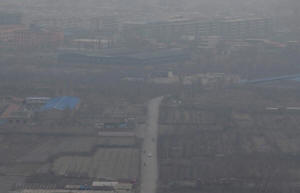|
The
move is the latest by local authorities in China seeking to step
up action to protect the environment by reducing pollution, a
key policy goal mandated by the government of the world's
second-biggest economy.
"Each level of officials must make anti-pollution tasks a
significant stance in their work...Those who neglect their
duties, forge monitoring data or fail the targets will be
punished," the provincial government of Shanxi said in a recent
statement.
Last week, China unveiled draft guidance on pollution reduction
during winter, asking 28 northern Chinese cities - including
four in Shanxi - to enact a series of measures that include
shutting some output capacity in high-emission sectors.
"Each city (in Shanxi province) should set up plans on
production restrictions in steel, construction materials,
non-ferrous and chemicals by the end of September each year,"
the provincial government said.
Shanxi aims to lower sulfur dioxide and nitrogen oxide emissions
by more than 20 percent by 2020 from levels in 2015, going
beyond the national requirement of 15 percent cuts. It's also
seeking to match national targets on reducing hazardous
particles, known as PM2.5, in its 11 cities.
The province also said will strictly ban the addition of new
factories in the steel, coke, metal casting, cement and glass
sectors in eight cities which have been identified by Beijing as
a "key battlefield" of the nationwide war on pollution -
Taiyuan, Yangquan, Changzhi, Jincheng, Jinzhong, Linfen,
Yuncheng and Luliang.
On Monday, Linfen city officials were sharply criticized by the
environmental ministry for deliberately disturbing air pollution
monitoring stations nearly 100 times in the past year, hiring
people to spray water on monitoring equipment to lower the
readings.
Shanxi, which accounted for a fifth of the country's total coke
output last year, also plans to impose "special emissions
restrictions" in the coke industry, ordering 40 percent of coke
plants to complete emission control upgrades by Oct. 1 this
year. The remaining plants must implement upgrades by Oct. 1,
2019.
It also aims to cut coal consumption and boost clean energy use
during winter heating by adding natural gas supplies and
eliminating small coal-fired power plants.
(Reporting by Muyu Xu and Josephine Mason; Editing by Kenneth
Maxwell)
[© 2018 Thomson Reuters. All rights
reserved.] Copyright 2018 Reuters. All rights reserved. This material may not be published,
broadcast, rewritten or redistributed.
Thompson Reuters is solely responsible for this content.

|
|







